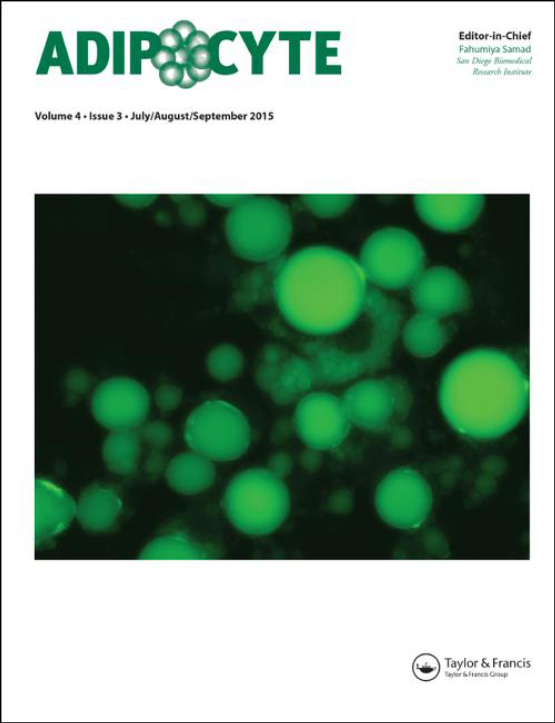Submit a Manuscript to the Journal
Adipocyte
For an Article Collection on
Novel Insights Into Adipose Tissue Biology: Role in Inter-Organ Communication and Metabolic Diseases
Manuscript deadline
30 August 2024

Article collection guest advisor(s)
Dr. Bianca Vezzani,
University of Parma
[email protected]
Prof. Alessandro Bartolomucci,
University of Minnesota Medical School; University of Parma
[email protected]
Novel Insights Into Adipose Tissue Biology: Role in Inter-Organ Communication and Metabolic Diseases
The adipose tissue is a plastic, dynamic, and heterogeneous tissue involved in various biological processes ranging from energy storage and metabolic homeostasis to host defense and tissue repair. The adipose tissue is an active site of paracrine neuro-adipose-immune communication, being a key node in the bidirectional communication between the brain and the rest of the body, via autonomic nervous system afferent/efferent pathways, endocrine signaling, and inter-organ communication (e.g. via extracellular vesicles). Recent discoveries and technological advances, ranging from whole-body mapping of neurons to single-cell omics, paved the way to investigate a previously unappreciated role for adipocytes and other adipose-resident cells, in regulating systemic metabolism, overall impacting metabolic homeostasis in health, disease, and aging. However, substantial knowledge gaps still exist on the molecular mediators involved in inter-organ communication and their integration by central and autonomic nervous systems.
This Article Collection in Adipocyte aims to provide a platform for the publication of forward-thinking research articles, reviews, and viewpoints that uncover the role of adipose tissue as a communication hub, playing a critical role in endocrine physiology and metabolic diseases.
Manuscripts responsive to this call for papers include studies describing: i) adipocyte, adipose-resident cells, or adipose-innervating neurons function, which use a multi-cell or multi-organ integrative physiology perspective; ii) new technological advancements to identify the secretome of adipocyte, adipose-resident cells, or adipose-innervating neurons; iii) physiological and bioengineering approaches designed to identify mechanisms of inter-organ communication centered on the adipose tissue; iv) changes in adipocyte, adipose-resident cells, or adipose-innervating neurons function, as well as inter-organ communication, occurring during aging; v) studies using artificial intelligence or machine learning approaches to characterize the role of adipocyte, adipose-resident cells, or adipose-innervating neurons in inter-organ communication in health and metabolic diseases are also of interest, provided they make a strong case that their relevance is to model whole organ physiology, rather than single cell signaling.
Manuscripts mainly focused on descriptive omics analyses, single-cell functional profiling, clinical observational studies, or gene-association studies lacking a mechanistic focus, will not receive high priority for inclusion in the Collection. Although vertebrate models and human-based experimental research are preferred, no model organism is excluded a priori. However, studies focused solely on comparative anatomy/physiology are unlikely to receive high priority.
Dr. Bianca Vezzani: European Ph.D. in Molecular biology and development, with postdoctoral experience in an international institute for regenerative medicine. Strong background in mesenchymal stem cells and perivascular environment, adipose tissue biology, and translational research. Ongoing research on developing an efficient model to study the neuroimmunemodulation in adipose tissue.
Prof. Alessandro Bartolomucci: Completed his pre-doc and postdoctoral training in behavioral neuroscience, psychobiology and metabolism. Recruited to the Univ Minnesota in 2010, he was promoted to Associate Professor with indefinite tenure in 2016 and Professor in 2022. He was awarded the 2016-17 Fesler-Lampert Chair in Aging Studies, the Ancel Keys Biomedical Scholar in Physiology and Metabolism, and is Director of the Physiology Core facility of the Medical School. Since 2023 he also holds a Professorship at the Dept of Medicine of the University of Parma. His laboratory is primarily interested in metabolic physiology, stress physiology and social determinants of health and aging.
Disclosure Statement: Dr. Vezzani and Prof. Bartolomucci declare no conflicts of interest regarding this work.
Benefits of publishing open access within Taylor & Francis
Global marketing and publicity, ensuring your research reaches the people you want it to.
Article Collections bring together the latest research on hot topics from influential researchers across the globe.
Rigorous peer review for every open access article.
Rapid online publication allowing you to share your work quickly.
Looking to Publish your Research?
Find out how to publish your research open access with Taylor & Francis Group.
Choose open accessSubmission Instructions
All manuscripts submitted to this Article Collection will undergo desk assessment and peer-review as part of our standard editorial process. Guest Advisors for this collection will not be involved in peer-reviewing manuscripts unless they are an existing member of the Editorial Board. Please review the journal Aims and Scope and author submission instructions prior to submitting a manuscript.